When someone is facing a challenge or needs encouragement, we often say “You got this.” It’s short, powerful, and full of support. But sometimes, finding other ways to say “You got this” can make your words feel even more personal, thoughtful, and emotionally comforting. Using different expressions shows you truly care, helping your message feel unique, heartfelt, and full of warmth. Whether you’re talking to a friend, coworker, or loved one, these alternatives can help you express strength, positivity, and belief in their abilities in a more meaningful way.
What Does “You Got This” Mean?
The phrase “You got this” means you believe in someone’s ability to handle a situation or overcome a challenge. It’s a way of showing faith, confidence, and emotional support. When you say this, you’re reminding someone that they already have everything they need — strength, courage, and skill — to succeed. It’s not just motivation; it’s reassurance that they’re capable and not alone.
Is It Professional or Polite to Say “You Got This”?
Yes, “You got this” is both polite and professional when used in the right context. In casual or friendly workplaces, it’s a great way to show encouragement. However, in more formal environments, you might use alternatives like “I’m confident in your abilities” or “You’ll do great.” The tone should always match your relationship with the person and the setting you’re in.
List of Say “You Got This”
- You can do it
- I believe in you
- You’ve got what it takes
- You’re stronger than you think
- You’ll crush it
- You’re made for this
- Keep going, you’re doing amazing
- I know you’ll succeed
- You’ve got this under control
- You’re capable of great things
- You always find a way
- You’re unstoppable
- You’re going to nail it
- You’ve come this far, keep going
- You’re ready for this
- You’re doing great
- You’ve got the power
- You’re built for challenges
- You’ll make it happen
- You’re more than enough
1. You Can Do It
Meaning: This phrase shows simple and genuine encouragement, reminding someone of their own capability and inner strength.
Scenario: Use it when a friend or colleague feels nervous before a big moment like an exam, job interview, or presentation.
Examples:
- You can do it — I’ve seen how hard you’ve worked for this.
- Don’t doubt yourself, you can do it.
- Take a deep breath, you can do it.
- I know this is tough, but you can do it.
- You’ve overcome harder things before — you can do it again.
Tone: Motivational and caring.
Explanation: This phrase encourages perseverance and self-belief, making the person feel capable and supported through gentle motivation.
2. I Believe in You
Meaning: Expresses strong confidence in someone’s potential and their ability to overcome obstacles.
Scenario: Perfect for close friends, family, or teammates who need emotional encouragement.
Examples:
- I believe in you more than you know.
- Even when you don’t see it, I believe in you.
- Keep going — I believe in you completely.
- You’ve done it before, and I believe in you again.
- You’ll find your way — I believe in you.
Tone: Deeply supportive and emotional.
Explanation: It creates a personal connection, reminding the listener that someone genuinely trusts and believes in them.
3. You’ve Got What It Takes
Meaning: Shows that someone already has the skills, courage, and strength to succeed.
Scenario: Ideal when encouraging someone before a big responsibility or challenge.
Examples:
- You’ve got what it takes to make this happen.
- Don’t second-guess yourself — you’ve got what it takes.
- You’ve trained for this, you’ve got what it takes.
- No need to worry, you’ve got what it takes to win.
- I’ve seen your effort — you’ve got what it takes.
Tone: Confident and uplifting.
Explanation: This phrase reinforces self-confidence by highlighting the person’s existing abilities and effort.
4. You’re Stronger Than You Think
Meaning: Reminds someone that their inner strength is greater than they realize.
Scenario: Use this when someone feels emotionally or mentally drained.
Examples:
- Don’t give up — you’re stronger than you think.
- You’ve been through so much; you’re stronger than you think.
- I know it’s tough, but you’re stronger than you think.
- Even in hard times, you’re stronger than you think.
- You’ll get through this — you’re stronger than you think.
Tone: Encouraging and compassionate.
Explanation: It reassures someone of their inner resilience, helping them rediscover their own courage and endurance.
5. You’ll Crush It
Meaning: A fun and energetic way to say someone will succeed impressively.
Scenario: Great for casual and upbeat settings like sports, creative projects, or interviews.
Examples:
- You’ve prepared so well — you’ll crush it today!
- Go out there and crush it like you always do.
- You’ll crush it — just be yourself.
- You’ve got everything you need to crush it.
- Keep that confidence — you’ll crush it.
Tone: Energetic, fun, and confident.
Explanation: It boosts excitement and helps replace anxiety with positive enthusiasm and energy.
6. You’re Made for This
Meaning: Expresses deep belief that someone is naturally equipped for the challenge ahead.
Scenario: Perfect for moments of destiny — promotions, performances, or big life steps.
Examples:
- You’re made for this, don’t doubt yourself.
- Every step you’ve taken led to this — you’re made for it.
- Trust yourself, you’re made for this.
- You’re ready because you’re made for this moment.
- You’ll shine — you’re made for this.
Tone: Reassuring and inspiring.
Explanation: Suggests that the person’s journey, experience, and character align perfectly with the task ahead.
7. Keep Going, You’re Doing Amazing
Meaning: A heartfelt way to encourage persistence while recognizing effort.
Scenario: Great for ongoing projects or emotional support during difficult times.
Examples:
- Keep going, you’re doing amazing.
- Don’t stop now — you’re doing amazing work.
- You’ve come so far, keep going.
- Every step counts, you’re doing amazing.
- Stay strong, you’re doing amazing things.
Tone: Gentle, kind, and supportive.
Explanation: Combines motivation with appreciation, recognizing progress while encouraging consistency.
8. I Know You’ll Succeed
Meaning: Shows full confidence in someone’s ability to reach their goal.
Scenario: Best for professional encouragement or personal reassurance.
Examples:
- I know you’ll succeed because you never give up.
- You’ve done the work — I know you’ll succeed.
- I believe in your path — you’ll succeed.
- Trust yourself, I know you’ll succeed.
- I can see your potential — you’ll succeed.
Tone: Confident and sincere.
Explanation: Offers certainty and hope, creating a strong emotional anchor of belief.
9. You’ve Got This Under Control
Meaning: This phrase reassures someone that they are handling things well and have the situation managed effectively.
Scenario: Perfect when someone feels overwhelmed at work or is managing multiple responsibilities.
Examples:
- Don’t worry, you’ve got this under control.
- Everything’s going smoothly — you’ve got this under control.
- You’ve planned well, you’ve got this under control.
- I can see your confidence — you’ve got this under control.
- Stay calm, you’ve got this under control.
Tone: Reassuring and confident.
Explanation: It provides calm reassurance and stability, showing that you trust their ability to stay composed and capable under pressure.
10. You’re Capable of Great Things
Meaning: A powerful statement reminding someone of their potential to achieve success and make an impact.
Scenario: Use it when someone doubts themselves or needs encouragement to pursue their dreams.
Examples:
- Don’t forget, you’re capable of great things.
- Believe in yourself — you’re capable of great things.
- You’ve got the talent, you’re capable of great things.
- Keep pushing forward, you’re capable of great things.
- I’ve always known you’re capable of great things.
Tone: Inspirational and hopeful.
Explanation: It inspires self-worth and confidence, reminding someone that their possibilities extend far beyond their current limits.
11. You Always Find a Way
Meaning: Highlights someone’s creativity and resilience in overcoming challenges.
Scenario: Ideal for encouraging problem solvers or people facing repeated obstacles.
Examples:
- You always find a way, no matter what comes your way.
- I’ve seen you work through worse — you always find a way.
- Don’t stress, you always find a way to succeed.
- Things might look tough, but you always find a way.
- You’ve got such determination — you always find a way.
Tone: Respectful and admiring.
Explanation: This phrase acknowledges consistent strength, showing admiration for someone’s persistence and adaptability.
12. You’re Unstoppable
Meaning: A bold, empowering phrase that celebrates someone’s drive and determination to keep going.
Scenario: Great for motivating someone in high-energy or competitive situations.
Examples:
- Nothing can stop you — you’re unstoppable.
- Keep that energy — you’re unstoppable today.
- You’ve faced challenges and won — you’re unstoppable.
- Your dedication proves you’re unstoppable.
- You’re unstoppable when you set your mind to something.
Tone: Energetic, empowering, and bold.
Explanation: It energizes the listener, helping them feel powerful, capable, and fearless in achieving their goals.
13. You’re Going to Nail It
Meaning: A fun and confident way to say someone will do something perfectly or succeed easily.
Scenario: Ideal before a performance, presentation, or big test.
Examples:
- Don’t stress — you’re going to nail it!
- You’ve practiced so much — you’ll nail it.
- I just know you’re going to nail it today.
- Stay calm, be yourself — you’ll nail it.
- Everything’s set — you’re going to nail it.
Tone: Excited, friendly, and encouraging.
Explanation: This upbeat phrase builds confidence while adding a touch of positivity and casual charm to your encouragement.
14. You’ve Come This Far, Keep Going
Meaning: Recognizes someone’s progress and encourages them not to give up.
Scenario: Perfect when someone feels tired or close to quitting.
Examples:
- You’ve come this far, keep going — don’t stop now.
- You’ve already overcome so much, keep going.
- Look at how far you’ve come, keep going.
- You’ve put in the effort, keep going strong.
- You’ve made it this far, just one more step.
Tone: Empathetic and steady.
Explanation: It gently reminds someone of their growth, helping them push forward by focusing on how much they’ve already achieved.
15. You’re Ready for This
Meaning: Expresses belief that someone has prepared well and is equipped for what’s ahead.
Scenario: Ideal before an exam, interview, or first day at a new job.
Examples:
- You’re ready for this — you’ve done all the work.
- You’re ready for this challenge, trust yourself.
- You’ve practiced enough — you’re ready for this.
- You’ve got the mindset — you’re ready for this.
- You’ve been preparing for weeks — you’re ready for this moment.
Tone: Supportive and affirming.
Explanation: It affirms preparation and competence, calming nerves by reminding someone they’ve already done everything needed to succeed.
16. You’re Doing Great
Meaning: A simple yet strong phrase that validates someone’s effort and progress.
Scenario: Perfect during ongoing efforts like learning, healing, or working through challenges.
Examples:
- You’re doing great — keep it up.
- Don’t be so hard on yourself, you’re doing great.
- You’re doing great — progress takes time.
- Keep believing in yourself, you’re doing great.
- You’re doing great, even if you can’t see it yet.
Tone: Gentle, reassuring, and kind.
Explanation: This phrase acknowledges effort over results, providing emotional comfort and steady encouragement.
17. You’ve Got the Power
Meaning: Emphasizes control, confidence, and the ability to influence outcomes.
Scenario: Perfect when motivating someone to take initiative or make decisions.
Examples:
- You’ve got the power to change this situation.
- Believe it — you’ve got the power inside you.
- You’ve got the power to make things better.
- You’re in charge here — you’ve got the power.
- Trust your instincts — you’ve got the power to succeed.
Tone: Empowering and motivational.
Explanation: It energizes someone to take action, reminding them that they control their path and their choices.
18. You’re Built for Challenges
Meaning: A powerful reminder that someone’s resilience and character make them ready for tough situations.
Scenario: Great for moments of stress, struggle, or change.
Examples:
- You’re built for challenges like this.
- You’ve handled worse — you’re built for it.
- Don’t lose hope — you’re built for challenges.
- You’ve got grit — you’re built for this.
- Remember, you’re built for challenges that make you stronger.
Tone: Strong and reassuring.
Explanation: This phrase strengthens confidence, reminding someone their struggles are proof of their capability, not weakness.
19. You’ll Make It Happen
Meaning: A confident way of saying that someone will achieve their goal through effort and determination.
Scenario: Best when motivating someone working hard toward a specific dream or target.
Examples:
- Keep your focus — you’ll make it happen.
- You’ve got the passion, you’ll make it happen.
- I trust you — you’ll make it happen.
- Stay determined, and you’ll make it happen.
- With your drive, you’ll make it happen soon.
Tone: Optimistic and confident.
Explanation: It reinforces trust in action, showing belief that persistence will lead to success.
20. You’re More Than Enough
Meaning: A deeply emotional phrase reminding someone of their worth and value just as they are.
Scenario: Ideal for comforting someone feeling insecure, anxious, or doubtful.
Examples:
- You don’t need to prove anything — you’re more than enough.
- Never forget, you’re more than enough.
- You bring so much value — you’re more than enough.
- You’re doing your best — you’re more than enough.
- You’ve always been enough — and more.
Tone: Gentle, heartfelt, and affirming.
Explanation: This expression offers deep emotional reassurance, helping someone feel accepted, loved, and confident in their worth.
Conclusion
Finding other ways to say “You got this” helps your encouragement feel more heartfelt, personalized, and genuine. Whether you’re uplifting a friend, motivating a coworker, or comforting a loved one, your words can inspire courage and bring comfort. Remember — sometimes, just saying “I believe in you” or “You’re doing great” can change how someone feels about themselves and their journey.
FAQs
1. Can I use these phrases in motivational speeches?
Absolutely! These alternatives add emotional depth and make your message more genuine and inspiring.
2. What’s a softer version of “You got this”?
Try “You’re doing great” or “You’re stronger than you think” for a gentler, more comforting tone.
3. Which phrase works best in a professional setting?
“You’re ready for this” or “I know you’ll succeed” sound encouraging yet professional and respectful.
4. How can I comfort a friend who’s nervous?
Use warm words like “You’re made for this” or “You’ve got what it takes” to ease their worry and build confidence.
5. Are these phrases suitable for text messages?
Yes! Each phrase works beautifully in short texts, making your encouragement feel personal and real.
Emma Brooke is a content writer at GrammerWay, specializing in English grammar, writing clarity, and common language errors. She creates easy-to-follow guides that help readers write accurately and confidently.
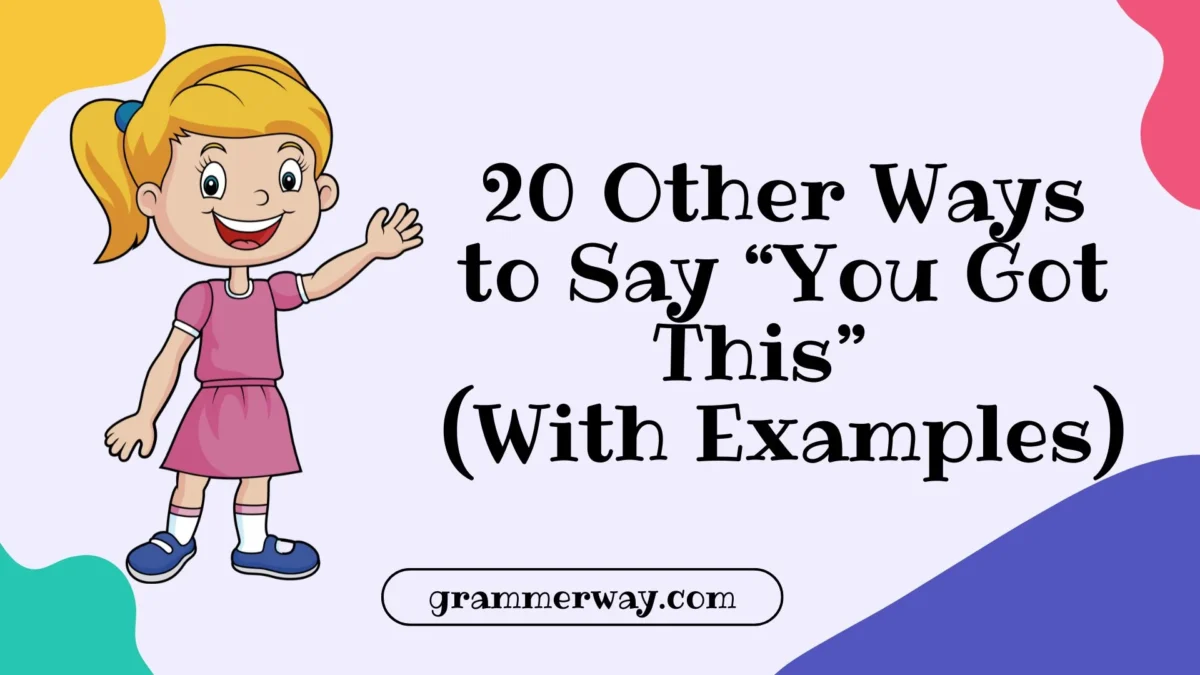
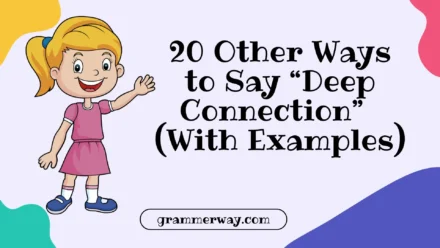
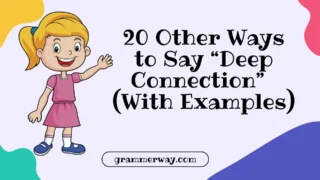


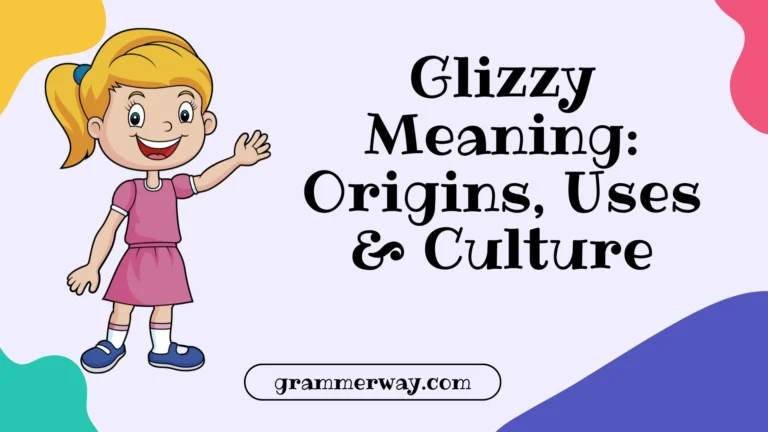
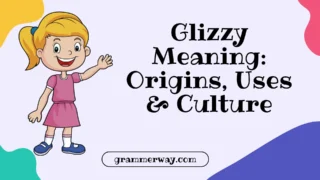
Leave a Comment